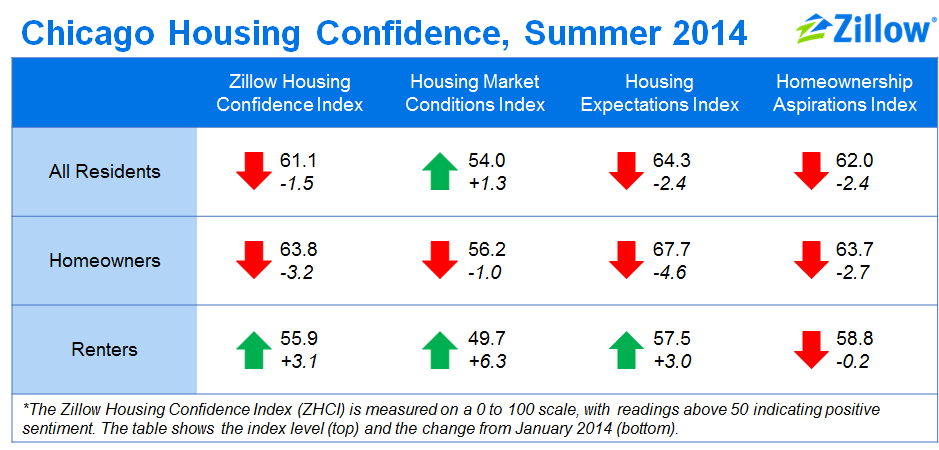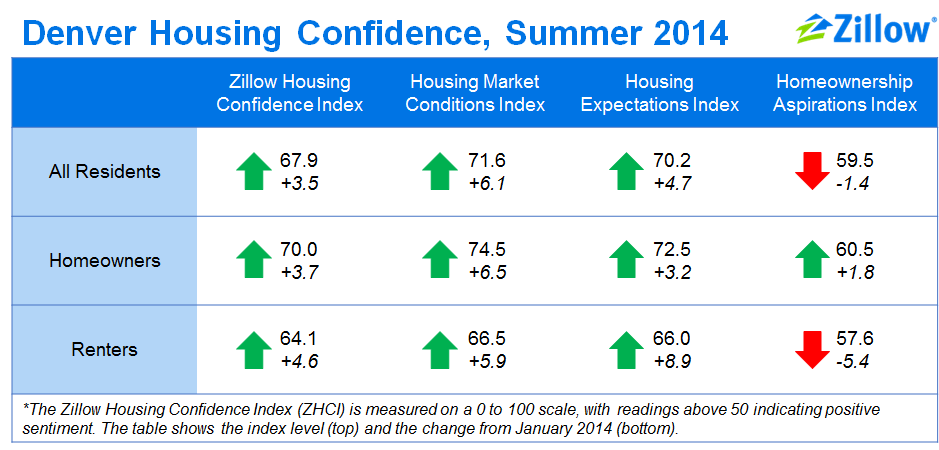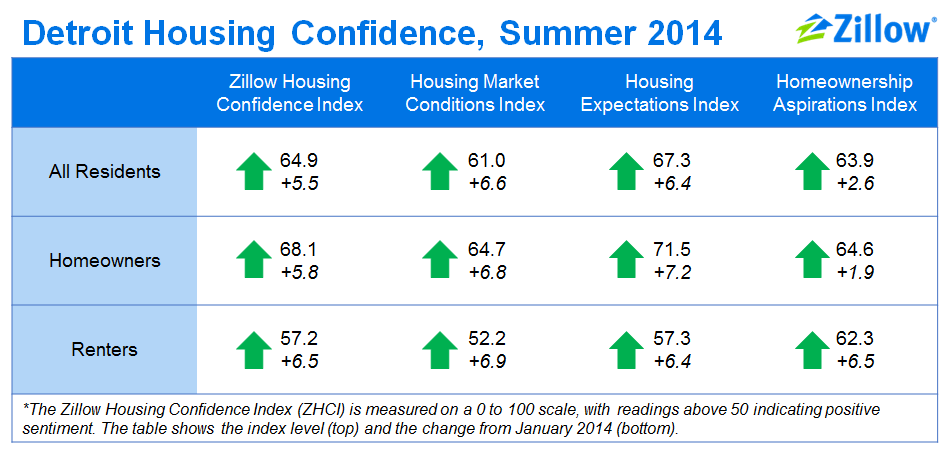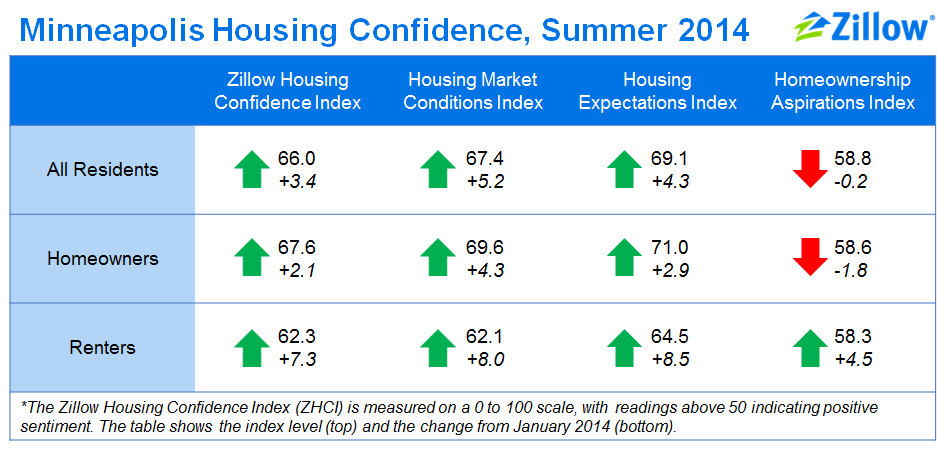This post is part 3 in a four-part series on housing confidence across the United States
Part 1, focused on the Northeast, can be found here.
Part 2, focused on the South, can be found here.
Part 4, focused on the West, can be found here.
Housing market confidence picked up robustly in the Midwest over the summer, boosted by a strong assessment of current market conditions among both renters and owners, according to the most recent Zillow Housing Confidence Survey.
The Zillow Housing Confidence Index, sponsored by Zillow and developed and administered by Pulsenomics LLC, offers unique insight into homeowners’ and renters’ intentions and attitudes about the housing market, and provides a gauge of housing market health looking forward. It is based on more than 10,000 interviews in 20 real estate markets.
The ZHCI is measured on a 0 to 100 scale, with readings above 50 indicating positive sentiment. The headline index is comprised of three sub-indices:
- The Housing Market Conditions Index (HMCI), which measures prevailing market trends and buying/selling conditions.
- The Housing Expectations Index (HEI), measuring expected changes in home values, home affordability and the value of homeownership.
- The Homeownership Aspirations Index (HAI), which measures household home-buying plans and attitudes toward the social value of homeownership.
Below is a detailed breakdown of homeowner and renter confidence in the Chicago, Denver, Detroit and Minneapolis metros.
Homeowners Expecting a Winter Freeze in Chicago
- Housing market confidence dipped in Chicago as the year progressed, with owners increasingly concerned about how the market will evolve over the next year.
- About 14 percent of Chicago renters said they expect to buy a home within the next year, which would translate into 400,000 new homeowners.
- Asians in Chicago are particularly skeptical of the financial and social benefits of homeownership.
Housing market confidence fell in the Chicago metro area compared to the beginning of the year, driven down by expectations both of how the market will evolve over the next year and by lower homeownership aspirations. The sub-indices for renters and homeowners moved in opposite directions. The homeowners’ sub-index deteriorated sharply because of a more pessimistic outlook for how the market will evolve in the next year, while the renters’ sub-index rose mainly because of an improved view of current market conditions.
Survey respondents expect home values to increase by about 2.7 percent over the next year in the Chicago metro area. Zillow’s September 2014 Home Value Forecast projects a 2.5 percent increase over the next year compared to a 7.4 percent increase over the past year. When asked to estimate how much home values increased over the past year, survey respondents said 1.1 percent, on average. More housing data for the Chicago metro area are available here.
More than two-thirds (70 percent) of Chicago-area renters said they are “confident” or “somewhat confident” that they will eventually be able to buy a home. Among young adults age 18 to 34 the share is much higher, at 88 percent. Over the next year, 14 percent of renters said they expect to buy a home. If these plans come to fruition, it would translate into about 400,000 new homeowners in the Chicago metro area.[1] An additional 24 percent of renters said they plan to buy a home one to two years in the future, which would translate into about 580,000 new homeowners between mid-2015 and mid-2016.
Hispanics and blacks in Chicago are more convinced of the financial benefits of homeownership than whites and Asians. Among Hispanics, 69 percent said they believe that buying a home is the best long-term investment a person can make, compared to 63 percent of blacks and 54 percent of whites. Asians in Chicago are particularly skeptical of the financial benefits of homeownership: only about one-third (37 percent) said they think that owning a home is the best long-term investment. Asians in Chicago are also skeptical about the social benefits of homeownership, with less than half (48 percent) of respondents saying they agree that owning a home is necessary to “live the good life” and “the American dream,” compared to 61 percent of whites, 62 percent of Hispanics and 63 percent of blacks.
Confidence Getting High in Denver
- Housing market confidence increased in Denver over the summer, with both owners and renters saying they feel better about the market.
- About 5 percent of Denver renters said they expect to buy a home within the next year, which would translate into 40,000 new homeowners.
- Hispanics in the Denver area are much more likely than other racial or ethnic groups to view homeownership as a central part of the American dream.
Housing market confidence improved in the Denver metro area compared to earlier in the year, with both the homeowners’ and the renters’ sub-indices showing improvement. The homeowners’ sub-index improved primarily because of an improved outlook about the current state of market conditions, while the renters’ sub-index improved on the strength of an improved outlook about how the market will evolve in the coming year.
Survey respondents said they expect home values to increase by about 3.8 percent over the next year in the Denver metro area. Zillow’s September 2014 Home Value Forecast projects a 3.8 percent increase over the next year compared to an 11.3 percent increase over the past year. When asked to estimate how much home values increased over the past year, survey respondents said 5.7 percent, on average. More housing data for the Denver metro area are available here.
Almost two-thirds (65 percent) of Denver-area renters said they are “confident” or “somewhat confident” that they will eventually be able to buy a home. Among young adults age 18 to 34, the share is much higher, at 75 percent. Over the next year, 5 percent of renters said they expect to buy a home. If these plans come to fruition, it would translate into about 40,000 new homeowners in the Denver metro area. An additional 27 percent of renters said they plan to buy a home one to two years in the future, which would translate into about 210,000 new homeowners between mid-2015 and mid-2016.
Hispanics in Denver are much more likely than other racial and ethnic groups to view homeownership as a central component of the American dream. A large majority (70 percent) of Hispanics in Denver said they agree that owning a home is necessary to live “the good life” and “the American dream,” compared to 51 percent of whites, 42 percent of Asians and 38 percent of blacks. Hispanics are also more likely to say they believe that owning a home is necessary to be “a respected member of society.” Almost half (43 percent) of Hispanics said they agreed with that statement, compared to 33 percent among both Asians and blacks and 31 percent of whites.
Confidence Revs Up in the Motor City
- Housing market confidence improved across the board in Detroit as the year progressed.
- About 17 percent of Detroit renters said they expect to buy a home within the next year, which would translate into 190,000 new homeowners.
- Detroit millennials are more likely than other generations to believe in the financial and social benefits of homeownership.
Housing market confidence increased across the board in the Detroit metro over the year, exhibiting the largest overall increase among all metros surveyed. The sub-index for renters saw the second largest improvement, and the homeowners’ sub-index had the largest increase among all 20 metro areas surveyed.
Survey respondents said they expect home values to increase by about 3 percent over the next year in the Detroit metro area. Zillow’s September 2014 Home Value Forecast projects a 3.5 percent increase over the next year compared to a 12.6 percent increase over the past year. When asked to estimate how much home values increased over the past year, survey respondents said 2.6 percent, on average. More housing data for the Detroit metro area are available here.
Almost three quarters (72 percent) of Detroit-area renters said they are “confident” or “somewhat confident” they will eventually be able to buy a home. Among young adults age 18 to 34 the share is much higher, at 91 percent. Over the next year, 17 percent of renters said they expect to buy a home. If these plans come to fruition, it would translate into about 190,000 new homeowners in the Detroit metro area. An additional 28 percent of renters said they plan to buy a home one to two years in the future, which would translate into about 260,000 new homeowners between mid-2015 and mid-2016.
Despite having come of age during a period when the Detroit housing market has faced substantial headwinds, Detroit’s millennials (age 18 to 34) are very optimistic about the financial and social returns to homeownership. Among millennials, 69 percent said they believe that owning a home is the best long-term investment a person can make, compared to 51 percent of Generation X (age 35 to 49) and 64 percent of Baby Boomers (age 50 to 64). Millennials are also much more likely to agree that owning a home is necessary to “live the good life” and “the American dream,” with 76 percent of millennials saying they agreed with that statement, compared to 50 percent of Generation X and 54 percent of Baby Boomers.
Mostly Upbeat in Minneapolis
- Housing market confidence has improved in Minneapolis, with confidence moving sharply higher among renters.
- About 10 percent of Minneapolis renters said they expect to buy a home within the next year, which would translate into 80,000 new homeowners.
- Minneapolis millennials are more skeptical than other generations of the financial returns to homeownership, but they are more likely to say they believe in its social benefits.
Housing market confidence has increased in the Minneapolis metro area, with sub-indices for both renters and homeowners moving higher. The assessment of current market conditions and expectations of how the market will evolve over the next year drove the sub-indices for both renters and homeowners higher. However, the Homeownership Aspirations Index deteriorated slightly for owners.
Survey respondents said they expect home values to increase by about 3 percent over the next year in the Minneapolis metro area. Zillow’s September 2014 Home Value Forecast projects a 2.7 percent increase over the next year compared to an 8.1 percent increase over the past year past year. When asked to estimate how much home values increased over the past year, survey respondents said 3.6 percent, on average. More housing data for the Minneapolis metro area are available here.
Two-thirds (66 percent) of Minneapolis-area renters said they are “confident” or “somewhat confident” that they will eventually be able to buy a home. Among young adults age 18 to 34 the share is much higher, at 88 percent. Over the next year, 10 percent of renters said they expect to buy a home. If these plans come to fruition, it would translate into about 80,000 new homeowners in the Minneapolis metro area. An additional 29 percent of renters said they plan to buy a home one to two years in the future, which would translate into about 210,000 new homeowners between mid-2015 and mid-2016.
Young adults in Minneapolis are skeptical of the financial benefits of homeownership, but are more likely than other generations to believe in the social benefits. Among millennials (age 18 to 34), 38 percent said they think that investments other than housing provide the best long-term investment returns, compared to 31 percent of Generation X (age 35 to 49) and 34 percent of Baby Boomers (age 50 to 64). However, 65 percent of millennials said they agreed with the statement that owning a home is necessary to live “the good life” and “the American dream,” compared to 43 percent of Generation X and 46 percent of Baby Boomers.
[1] Estimate calculated by applying home purchase expectations from the Zillow Housing Confidence Survey to household tenure estimates from the 2012 American Community Survey. Figures are for individuals, not households.
Alex Hubbard assisted with the research and drafting of this brief.



